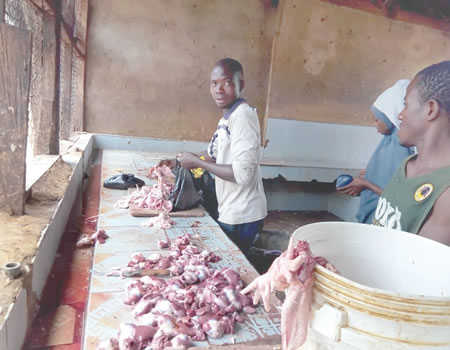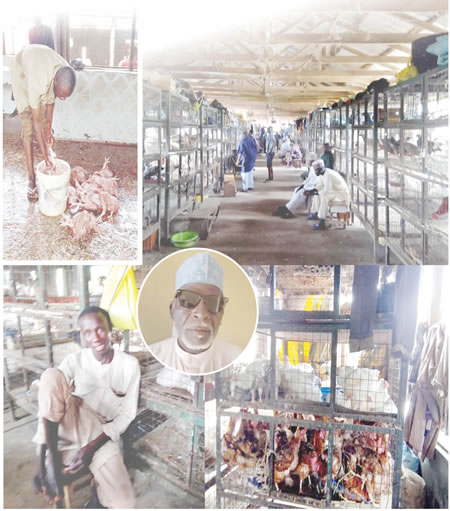THE poultry business in Nigeria is reportedly worth N1.2 trillion, while about 1.5 million tons of poultry is consumed annually. Unfortunately, only 30 per cent of that volume is produced in the country. The remaining 70 per cent is imported, and also smuggled into the country, as frozen poultry products. Though the federal government has been making efforts to implement a ban order on poultry importation into the country, it has not really succeeded for unexplained reasons. Similarly, local poultry farmers have not been able to fill in the very wide gap between local production and actual consumption. In these days of unemployment, one area that is believed could provide employment for Nigerian youth is the poultry business; unfortunately, they do not see opportunities in the industry.
An example of where ample opportunity exists in the sector is the Kaduna Bird Market on Sokoto Road. The market is reputed to be the biggest poultry market in Northern Nigeria. Buyers regularly throng the market on a daily basis to buy chickens in large volumes. Hundreds of customers go to the market to buy chickens, including local ones. Other species of birds that can be bought in the market include pigeon, guinea fowl, duck, turkey, ostrich, geese, parrot and peacock.
Nine years down the line, the market is still flourishing and waxing stronger, thanks to the efforts of its chairman and his executive members who have been working to ensure that the goals of the market came to fruition.
Building the market
Going down memory lane, the state chairman of the market’s Chicken Sellers Association, Alhaji Bala Namanu, informed that the market was built following an outbreak of bird flu in the country about a decade ago. According to him, many of the members of the association lost many chickens to the disease at that time. In an effort to curtail further recurrence, and also assist them to rebuild their businesses in an organised manner, the Federal Government then, under the Late Alhaji Umaru Yar’adua, and the World Bank, decided to build the poultry market in the state. While the Federal Government was to provide the expertise and technical skills, the World Bank was to finance the construction of the market in some states of the federation.
Recounting the bird flu experience, a chicken seller, Haruna Ibrahim, told Sunday Tribune that it was the most traumatic experience he had to pass through since he started selling chicken. “On a single day, I lost over 300 chickens to bird flu. To compound my woes, nobody deemed it fit to compensate me. I had to start the business all over again by borrowing money from an in-law. Looking back, I have made tremendous progress,” he said.
According to investigations, to date, in the whole country, only four chicken markets are in existence, and the Kaduna chicken market is one of the flourishing ones located in the North.
However, this couldn›t have been possible without the foresight of the leadership of the poultry sellers association under Namanu, who preferred that sellers should rebuild the market by themselves, rather than take money from others to do so. “When bank officials came, I told them that all we needed was a market; and they were not interested in money. They were very pleased with my suggestion,” Namanu revealed. After a series of meetings, the bank officials insisted that the chicken sellers should provide counter-fund, but the affected chicken sellers still didn’t have money. Namanu then consulted the rich among them and they eventually raised a huge amount of money, which was lodged in an account after assuring the donors that the association would return the money later.
“We were able to offset all our debts. Later, when the bank was satisfied that we had fulfilled our own obligations, they told us they would start construction work as soon as we got a piece of land,” he said.
The chicken sellers later met with the then governor, Namadi Sambo, who instructed the state ministry of land to look for a place in the metropolis where a market could be sited. An approval was later given by the governor for construction work to commence. On the completion of the market, the then Minister of State for Agriculture, Mrs Fidelia Njeze, inaugurated it in 2009.
According to the secretary of the market association, Mallam Jibrin Aliyu, the market is a modern poultry market which can accommodate over 5,000 chickens at a time and has 32 stalls in the market, including a modern abattoir. Today, youths have found employment in the market and are putting food on the table for their families. Sunday Tribune learnt that over 250 youths are presently working in the market. Though many of them do not sell chicken or any of the bird species, they work at the abattoir feeding the chicken, and also work as attendants.
Living on the market
Since the construction of the market, other small markets have sprung up around it. There are now markets where yams, potatoes and meat are sold. There is also a restaurant, kiosks and a car wash, among many other small businesses that go on around the vicinity. One of the youths working at the market, Aminu Abubakar, told the Sunday Tribune that “he had been coming to the market for the past four years” and, from the little money he made doing business in the market, he “sponsored himself through his college education”. Abubakar, who is awaiting admission to a polytechnic, is currently sponsoring his two siblings who are in secondary schools in the state.
A female worker in the market, who pleaded for anonymity, said that she buys chicken intestines at the market and sells to restaurant operators and suya sellers. According to her, she makes between N1,500 to N2,000 each day, which for her, “is enough to take care of my old parents.”
Malama Hafsat Ibrahim is a widow. Like others whose livelihood revolves around the market, she goes there every day to buy chicken intestines which she fries and sells to her customers. According to her, chicken intestine is a delicacy loved my many. “I feed my children and even pay my rent from this business. So, I can say that I am doing well,” she said.
Another shop owner who also pleaded for anonymity, said: “I built my house, sponsored myself and my wife for pilgrimage in Saudi Arabia,” while another chicken seller told Sunday Tribune that from the proceeds he has made so far, he has been able to sponsor four of his children to the university level.
The vice chairman of the market association, Mallam Yahaya Aliyu, revealed that part of the efforts put in place to ensure that the market is kept clean always is regular sanitation. “At the end of daily business activities, some youths stay behind to ensure that the entire building premises is washed and disposed of all forms of dirt. In addition, we have veterinary doctors who come to vaccinate the birds against diseases such as bird flu. Waste collectors come to the market twice in a week to clear all rubbish.”
However, despite the numerous achievements recorded by the chicken sellers, their major problem is how to expand the business. According to the chairman, “We want the federal, as well as the state government to come to our aid. We need financial support. Giving us soft loans will enable many of us to expand our businesses. Those without capital will be able to stand on their own, more especially these youths that are still doing petty work in the market.”
While the chicken sellers are hoping to expand their businesses, the question remains: If the borders are still porous with tons of smuggled products coming in, will the chicken business expand? The answer, as they say, is hanging in the air.







